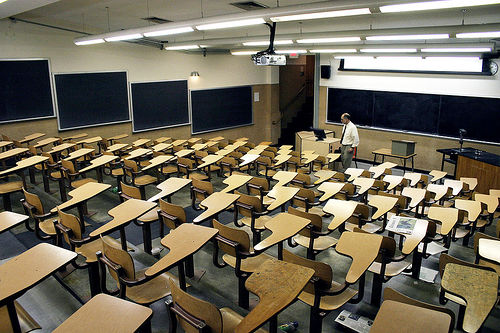Published on
Educators Learning To Teach Again: Not A Revelation, Just Common Sense

The story continues — I received some incoming flack from sincere, dedicated teachers about my comments last week regarding the NCLB CRCT scandal in our nation’s public schools. Hey, I didn’t create nor contribute to this behavior. Further, my brother was an excellent high school teacher for all his working life. The facts are what they are. We will never make up the losses those students suffered by changing their test scores rather than teachers doing their job better.
But then, there is another angle to this tragic story, brought out in the 2002 book “Working on the Work”, by Phillip C. Schlechty Ph.D. Our local Superintendent having known Schlechty, wrote a column in the local paper last week about his work that reminded me about the book I had been given by a colleague some time ago.
Dusting off the book, I recalled when I first read it, it was not about making students nor teachers work harder. Schlechty, an education consultant, publisher of several modern era books on education and founder of The Center for Leadership in School Reform, points out that public school educators are under tremendous pressure to improve student performance – an obvious understatement today.
According to Schlechty, “There are three ways to respond to this pressure:
- Work on the students
- Work on the teachers
- Work on the Work
On point one, we all know the days of threatening, pandering, bribing and rewarding may generate short term benefits, but will seldom change behaviors nor comprehension among today’s short-attention span student. Regarding point two, the CRCT scandal speaks for itself. That leaves point number three and the reason to take a second look at the book.
The thesis of the book offers that students work must become more meaningful and engaging. Hmmmmmmm! Sounds familiar to learning leaders in the corporate world.
A second (paradigm) is that maybe “teachers are already doing all they can do”, given the pressures, politics, funding debacles and scandalous behaviors. Further, there aren’t enough good teachers period, no matter what the pay-for-performance metrics.
The author suggests working on the administrator to become better at working on the teachers to be better teachers so that students gain the end benefits. Now there’s a novel idea, but that obviously hasn’t worked either – given tenure, unionization and job security most teachers now are sheltered by. Example. Every month it costs Georgia and Atlanta taxpayers $1 million for salaries and benefits for those teachers given administrative leave while awaiting their due process in the CRCT test scandals. Sounds more like the same old protectionism of government payrolls we’ve seen so much of recently in the news.
What about the hundreds or thousands of teenagers whose grades were changed for the better with no hope of recovery, not knowing what they didn’t learn. What do they get? What have they learned from this? More dishonesty, which there seems to be more than enough to go around these days.
As it turns out, what Schlechty found was that “hard working teachers were still instructing their students, not engaging them.” Student could ignore and glaze over for lack of interest without consequences. Guess what? Here lies the paradox. Students have mostly been instructed in class with overburdening homework for students throughout most of their K-12 formal learning experiences. Today’s kids are expert gamers at 6, Internet whiz at 11, interactive chats and social networks at 14. Instruction curriculum is boring to this generation. These supped up techies want to be engaged, challenged with experiential learning they can chat and collaborate about. Need evidence? Follow how Kahn Academy has grown with interesting and challenging videos in math and science coursework presented in an interesting and experiential manner. I get it, do teachers?
What’s the answer? Get local again. Get more parents and local leaders involved who can find ways to engage students. Be realistic with parents about our situation. Most want their children to achieve an education, not be given one, even those from the worst home environments. It’s the path to a better life and there is lots of evidence of that. Make it fun. Make “challenging” in the manner the engages.
It doesn’t take much. My 5 year old, 4 year old, and one year old grandsons are fortunate in that their parents provide a good home with lots of friends, love and toys. They regularly frequent our house, just 10 minutes away, which has plenty of purchased toys brought from their parents’ home. However, a big box to be creative with, some cut wood blocks to build with, and gardening in our back yard are their preferences. They love the creativity and engaging simple learning we share with them. It’s experiential learning and will last them for their lifetime. Simple! Not complicated!
Author Perspective: Business



